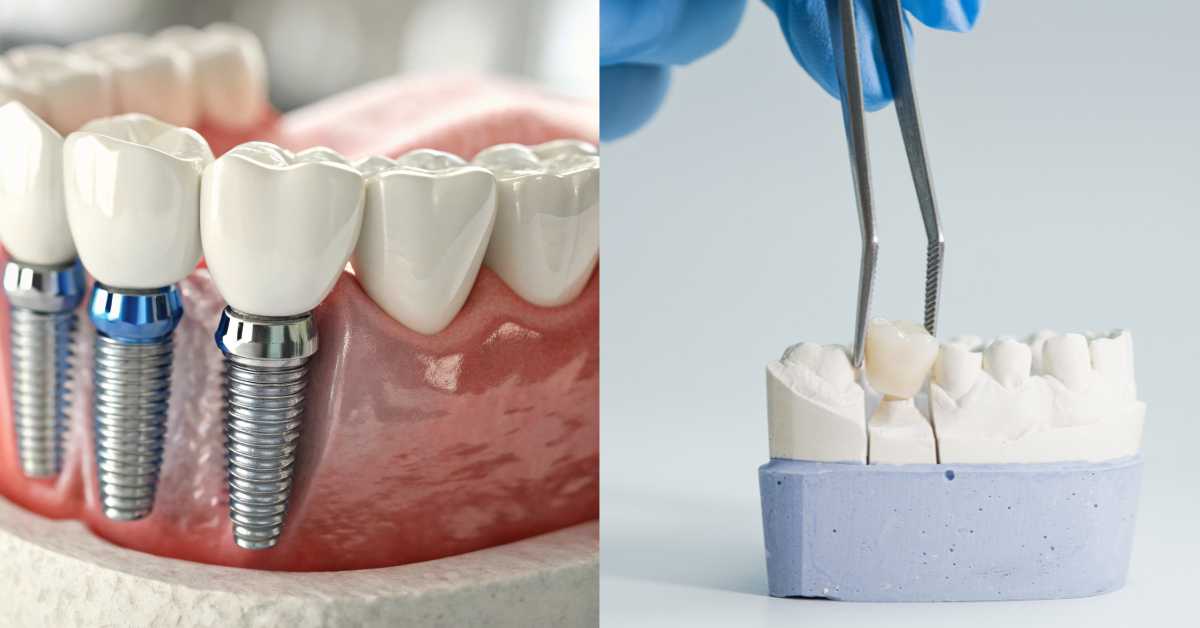Dental Implants vs Bridges: Which Option Is Right for You?

Losing a tooth isn’t just about the gap in your smile. It affects how you eat your favourite foods, the way you speak, and, let’s be honest, how confident you feel when you’re laughing with mates or meeting new people. The good news? Modern dentistry has come a long way, and there are solid options out there to replace missing teeth.
Two of the most popular choices are dental implants and bridges. But which one’s actually right for you? Let’s have a proper look at both.
What Are Dental Implants?
Think of a dental implant as a brand-new tooth root. It’s a small titanium post that gets placed into your jawbone, acting as a rock-solid foundation for the crown that sits on top, the bit you actually see when you smile.
Over a few months, the implant gradually fuses with your bone through a natural process called osseointegration. Once that’s happened, it’s in there for good. You’ve essentially got a new tooth that behaves just like the original.
Why people choose implants:
- They look, feel, and function like your natural teeth
- With proper care, they can last decades, sometimes for life
- They help preserve your jawbone and prevent bone loss
- No need to touch the healthy teeth next door
The main trade-off? Time. The whole process can take several months because your jaw needs to heal properly before the final crown goes on. But once it’s done, you’ve got something as close to the real deal as you can get.
What Are Dental Bridges?
A bridge does exactly what the name suggests, it bridges the gap. It’s a false tooth (or teeth) that’s anchored in place by the teeth on either side of the space. Those neighbouring teeth are reshaped and capped with crowns, which then hold the replacement tooth in the middle.
Why people choose bridges:
- Much faster, usually done within a few weeks
- More affordable upfront than implants
- Great for restoring your ability to chew and speak properly
- A practical option if your jawbone isn’t strong enough to support an implant
The downside is that you’re relying on the surrounding teeth for support, which means filing down healthy teeth. Bridges also don’t do anything to stop bone loss beneath the missing tooth, which implants naturally prevent.
Cost Comparison
Let’s talk about money, because it matters.
In Australia, dental implants typically cost somewhere between $3,000 and $6,000 per tooth, depending on how complex your case is and what materials are used.
Bridges are generally easier on the wallet upfront, ranging from $1,500 to $3,500 per tooth replaced.
But here’s the thing: implants often work out better value in the long run. They can last a lifetime with good care, whereas bridges usually need replacing every 10 to 15 years. So while you’re paying more initially for an implant, you might not need to fork out again down the track.
Durability and Maintenance
Implants are pretty low-maintenance. Brush twice a day, floss regularly, see your dentist for check-ups, treat them like your natural teeth and they’ll serve you well for decades.
Bridges are durable too, but they need a bit more attention. Because the supporting teeth are crowned, they’re more vulnerable to decay or gum disease if you’re not diligent with your oral hygiene. Keep on top of it, though, and they’ll do the job nicely.
Which Option Should You Choose?
There’s no one-size-fits-all answer here. It really comes down to your specific situation, your oral health, your budget, and what you’re hoping to achieve long-term.
Go for dental implants if:
- You want a permanent, natural-looking solution
- You’ve got the time and budget to invest
- Your jawbone is healthy enough to support them
Go for a dental bridge if:
- You’re after a quicker, more affordable fix
- Implants aren’t suitable due to bone density or other health factors
- You’d prefer to avoid the longer healing process
Ready to Take the Next Step?
Whether you go with implants or a bridge, both options can genuinely restore your smile and make a real difference to your quality of life. The best thing you can do now is have a chat with your dentist. They’ll assess your oral health, talk through your options, and help you figure out what makes the most sense for your situation and budget.
Your teeth aren’t just for chewing, they’re tied to how you feel when you speak, laugh, and connect with others. So whether you choose the long-term stability of an implant or the faster route of a bridge, taking action to replace a missing tooth is always a step towards feeling more like yourself again.



